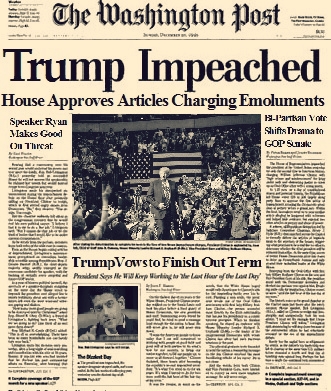Most people, until a few days ago, hadn’t heard of Dave Camp, the Republican chairman in charge of the House Committee on Ways and Means. That powerful committee has, among other things, jurisdiction over Social Security, Medicare, unemployment bennies, food stamps (TANF), and federal tax policies.
And regarding those tax policies, the committee chairman has been working on tax reform for a long time. This week, to the chagrin of many Republicans in the House and elsewhere, Dave Camp, who will soon be term-limited out of his continuing chairmanship of the committee, released his work product, the Tax Reform Act of 2014. And, somewhat surprisingly, some on the left are taking it seriously, even if it is revenue neutral and has other flaws. But not so surprisingly, partly because some on the left can take the proposal seriously, is that the usual money-holding suspects on the right are pooh-poohing it.
You can see the details of the proposal all over the place (here is a relatively thoughtful conservative critique), but liberal commentator Jonathan Chait began his short analysis of the plan by saying that Camp’s tax-reform proposal,
does something remarkable: It actually reforms the tax code. It doesn’t use the pretense of reform to shift the tax burden off the rich, as Republican “tax reform” plans usually do, and it does not use hand-waving to gesture in the direction of reform without following through. Camp has actually plunged his hands into the guts of the tax code and pulled out item after item. It may be the most impressive and ambitious domestic policy proposal crafted by a major Republican in a generation.
Chait notes how folks like the writers of The Wall Street Journal editorial page have “spent decades building a shrine to the spectacular wrongness of supply-side economics,” and then he gives Camp credit for not championing that spectacular wrongness:
The evidence suggests that cutting tax rates, financed by deficits, does little or nothing to spur economic growth. But Camp’s plan doesn’t do that. It instead reduces tax rates by eliminating preferences in the tax code. Subsidies for home mortgage debt and employer-sponsored insurance, among others, would be radically scaled back. And eliminating these kinds of favoritism encourages workers and businesses to instead follow market signals, and likely to make more market-friendly decisions.
Of course, Chait, as a liberal, notices all kinds of things wrong with Camp’s plan. Camp, after all, is a Republican, so it is no surprise that no new revenues will be raised if his plan were to become law, or that “oil drillers” are taken care of while “green energy” suffers. But Chait also points out something in Camp’s plan that has pissed off Wall Street banksters:
His plan would impose a new fee on large banks (which enjoy an implicit subsidy by virtue of being so large they’re apt to receive a bailout if they fail) and caps the value of tax deductions, both goals embraced by Obama. It eliminates the carried interest loophole. It sets the top tax rate at 35 percent, not the fantastical 25 percent rate proposed by Mitt Romney, Paul Ryan, and other Republicans. Camp is actually committed to the goal of reforming the tax code in a way that maintains (rather than reduces) revenue levels, and holds the relative burden on the rich and poor constant.
The reaction to this part of Camp’s legislation is at once predictable and disturbing. Just look at this headline from Politico yesterday:
Wall Street threatens GOP on bank tax
First line: “Wall Street is warning Washington Republicans: The money spigot is turning off.”
Then: “Rep. Dave Camp’s tax proposal — which jacked up taxes on banks and threatens the bottom line of  some major private equity players in New York — has infuriated donors in high finance.”
some major private equity players in New York — has infuriated donors in high finance.”
As I say, that reaction is not surprising. But it ought to disturb all Americans, including Tea Party Republicans, whose 2009 movement began, at least ostensibly, as a populist reaction to the bailout of the financial industry, a group of greedy folks who helped wreck the economy. None of us should put up with the kind of extortion suggested by that Politico headline. None of us should tolerate the idea that people with lots of money can buy our politicians like they were buying shares in a widget company. None of us. This is our democracy we are talking about, for God’s sake.
The Politico article continues:
Lobbyists for Bank of America, Goldman Sachs and JPMorgan and others are meeting privately with lawmakers to explain what the bank tax would cost and how it would function.
Big banks want to turn Republicans against the bank tax. The situation puts the party at risk of seeing a reliable source of campaign cash dry up right in the middle of a critical election year.
And:
Without Wall Street, Republicans risk their coffers emptying. The securities and investment industry is the largest contributor — besides candidate committees — to the National Republican Congressional Committee this cycle, directing $3.5 million to the party committee, according to the Center for Responsive Politics. In the 2012 election cycle, the financial services industry ponied up nearly $9.9 million.
Let’s be clear: Democrats, most of whom favor campaign finance reform, also take money from rich people. They have to, if they are to survive in this money-driven, anti-democratic system. But all of us, even the most rabid Tea Party “patriot” out there, ought to get angry over what money has done and is doing to our political system. An earnest Republican comes along with some ideas that are not completely based on phony trickle-down economics, and he, or rather his proposal, is shot dead on the spot by people whose guns don’t shoot bullets but big bucks.
Let me leave you to contemplate what Roll Call’s David Hawkings said about what the new reform proposal, not even considering its policy ideas, will do:
The Camp bill may be properly cited as The Tax Lobbyists’ Full Employment and Economic Stimulus Act of 2014.
Even though the measure is highly unlikely to make it onto the House floor — and will struggle to get a majority from the roster of 23 Republicans and 16 Democrats during its not-going-to-be-scheduled-anytime-soon markup at Ways and Means — law firms and K Street shops will generate countless billable hours just by parsing the bill’s language and coming up with strategies for preserving all the niche deductions, exclusions and exemptions that have only theoretically been placed in jeopardy.
If those lobbyists didn’t have connections to moneyed interests who give tons of dough to our politicians, and if our politicians worked in a system where they didn’t depend on rich people giving them tons of dough to get elected, then our politicians perhaps would properly weigh the input of those lobbyists, rather than give them all the influence that money can buy.
And shame on us—all of us—for putting up with it.








 Not wanting to waste a moment, Chris proposed to Ceri, who had four kids, including a set of triplets. “He loved me and took me on with four children as if they were his own,” Ceri said. “They loved him so much too.” She explained:
Not wanting to waste a moment, Chris proposed to Ceri, who had four kids, including a set of triplets. “He loved me and took me on with four children as if they were his own,” Ceri said. “They loved him so much too.” She explained:



 Apparently there are some Kansas Republicans left who haven’t been completely radicalized by religious zealots in the state. But the fact that such a reactionary piece of legislation passed one side of the legislature in 2014—2014 for God’s sake—says a lot about not only about the Republican Party, but it speaks to why it is that our national government is so profoundly, if not dangerously, divided.
Apparently there are some Kansas Republicans left who haven’t been completely radicalized by religious zealots in the state. But the fact that such a reactionary piece of legislation passed one side of the legislature in 2014—2014 for God’s sake—says a lot about not only about the Republican Party, but it speaks to why it is that our national government is so profoundly, if not dangerously, divided. laws in the country and paved the way for the eventual legitimation of same-sex marriage, which is now driving right-wing Christians into convulsions not seen since the
laws in the country and paved the way for the eventual legitimation of same-sex marriage, which is now driving right-wing Christians into convulsions not seen since the 
 If that stuff about cleansing doesn’t scare you, then you don’t know who Cleon Skousen and Glenn Beck are. Perhaps now you can see why the Republican Party looks the way it does. This kind of tactical action is going on, has been going on, all over the country. Mr. Putnam provides local zealots everywhere, those who have a biblical ax to grind, with essential knowledge of how to go about that grinding. Become “party officials” at the local level, he says. Why? Because:
If that stuff about cleansing doesn’t scare you, then you don’t know who Cleon Skousen and Glenn Beck are. Perhaps now you can see why the Republican Party looks the way it does. This kind of tactical action is going on, has been going on, all over the country. Mr. Putnam provides local zealots everywhere, those who have a biblical ax to grind, with essential knowledge of how to go about that grinding. Become “party officials” at the local level, he says. Why? Because: If you ever wondered why a disturbed and disturbing man named Todd Akin became the Missouri GOP’s U.S. Senate candidate in 2012, now you know why. Even after Akin was disgraced, even after his horrific views on women and rape were revealed, even after the Republican establishment abandoned him, John Putnam
If you ever wondered why a disturbed and disturbing man named Todd Akin became the Missouri GOP’s U.S. Senate candidate in 2012, now you know why. Even after Akin was disgraced, even after his horrific views on women and rape were revealed, even after the Republican establishment abandoned him, John Putnam 



 But such thinking is part of the long-time conservative critique of Democrats and their fondness for safety-net programs. On Sunday, Chris Wallace asked former-intellectual-turned-Fox-commentator George Will: “is giving people a cheaper way to get health insurance without working so much — is that a good thing or a bad thing?” As he always does, as he is no doubt required to do to get his big paycheck from Fox, Will took aim at liberals:
But such thinking is part of the long-time conservative critique of Democrats and their fondness for safety-net programs. On Sunday, Chris Wallace asked former-intellectual-turned-Fox-commentator George Will: “is giving people a cheaper way to get health insurance without working so much — is that a good thing or a bad thing?” As he always does, as he is no doubt required to do to get his big paycheck from Fox, Will took aim at liberals:
